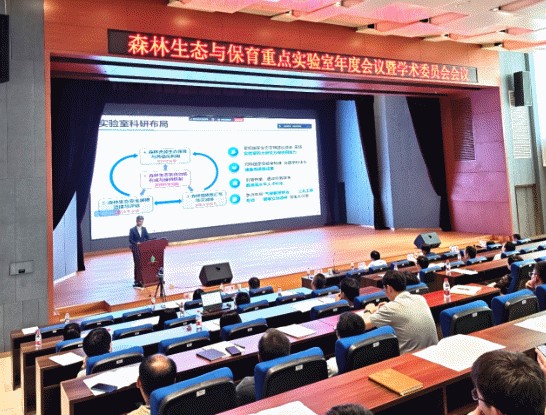IAE Hosts Annual Meeting to Advance Forest Ecology and Conservation Research
The Institute of Applied Ecology (IAE) of the Chinese Academy of Sciences (CAS) convened the annual meeting of the Academic Committee of its Key Laboratory of Forest Ecology and Conservation on August 11, 2025.
The Academic Committee featured a distinguished panel of members: Academicians CAO Fuliang of Nanjing Forestry University, ZHANG Shougong of the Chinese Academy of Forestry, ZHANG Jiabao of the CAS Institute of Soil Science, YU Guirui of the CAS Institute of Geographic Sciences and Natural Resources Research, FENG Qi of the CAS Northwest Institute of Eco-Environment and Resources, LIU Shirong of the Chinese Academy of Forestry, and ZHU Jiaojun, director of IAE, CAS. Other invited experts included Professor HE Jinsheng of Lanzhou University, Researcher YAN Junhua of the CAS South China Botanical Garden, Professor YU Haipeng of Northeast Forestry University, Researcher YANG Yuanhe of the CAS Institute of Botany, Professor BAI E of Northeast Normal University, and Professor CHU Chengjin of Sun Yat-sen University.
The session was chaired in turns by Academician FU Bojie, director of the Academic Committee of the key laboratory and a leading ecologist at the Research Center for Eco-Environmental Sciences, CAS, and SUN Tao, deputy director of the laboratory. More than 70 participants, including laboratory staff, researchers, and graduate students, joined the discussion. Senior officials from CAS, including PAN Tao, director of the Key Laboratories Division of the CAS Bureau of Development and Planning, and REN Xiaobo, director of the Department of Atmospheric, Oceanic and Ecological Environment of the CAS Bureau of Sustainable Development, also attended the meeting.
In his remarks, PAN Tao commended the laboratory’s progress over the past two years and urged the team to seize the opportunity of institutional reforms to set clear development goals for the coming period, with the aim of joining the national sequence of key laboratories following evaluation by the Ministry of Science and Technology. REN Xiaobo praised the laboratory’s contributions in projects, talent development, and scientific output, stressing that its mission should be closely aligned with national needs in forest ecology and conservation. He called for stronger talent recruitment, pursuit of major research tasks, and ensuring practical application of field station results.
WANG Yangdong, president of the Chinese Academy of Forestry, reaffirmed his institution’s commitment to deepening cooperation with the CAS Institute of Applied Ecology. He said both sides would work together to build a world-class laboratory and provide robust scientific support for China’s forest ecology and conservation.
The annual progress report highlighted major achievements since the laboratory’s establishment in 2024. The laboratory procured multiple national-level projects, including a strategic consultation project of the Chinese Academy of Engineering, national key R&D programs, and several National Natural Science Foundation of China (NSFC) projects. To date, the laboratory has published 252 papers in leading journals such as Nature (with corresponding authorship), Nature Climate Change, PNAS, and The ISME Journal. It has won 22 awards at national and provincial levels, including the CAS Young Scientist Award, the CAS Youth International Partnership Award, and the Liaoning Provincial Science and Technology Progress Award. Six policy consultation reports were adopted by government agencies including the National Forestry and Grassland Administration.
During the meeting, researchers HAO Guangyou, YAN Tao, GAO Tian, and ZHANG Huaiqing delivered academic presentations on the laboratory’s four major research directions. Experts praised the laboratory’s achievements and provided forward-looking suggestions. They highlighted the importance of supporting the “Three-North Shelterbelt Program” during the 15th Five-Year Plan, expanding research to cover southern forest ecosystems, promoting synergy among China’s “four major forest resources databases,” and enhancing outcomes in high-value forest utilization and understory economy. Suggestions also included strengthening cooperation with partner institutions through open funds and joint graduate training.
In his concluding remarks, FU Bojie stressed that the laboratory should focus over the next two years on meeting national strategic needs, aiming to enter the national key laboratory system as soon as possible. He urged the team to deepen research across life processes, ecological processes, environmental processes, and management processes to showcase the laboratory’s unique strengths.
Closing the meeting, Director ZHU Jiaojun expressed gratitude to all experts and committee members. He pledged to translate the recommendations into concrete actions, and strive to establish the laboratory as a world-class center for forest ecology and conservation research.

Photo: The annual meeting of the Academic Committee of the CAS Key Laboratory of Forest Ecology and Conservation was held on August 11 in Shenyang, Liaoning Province.



